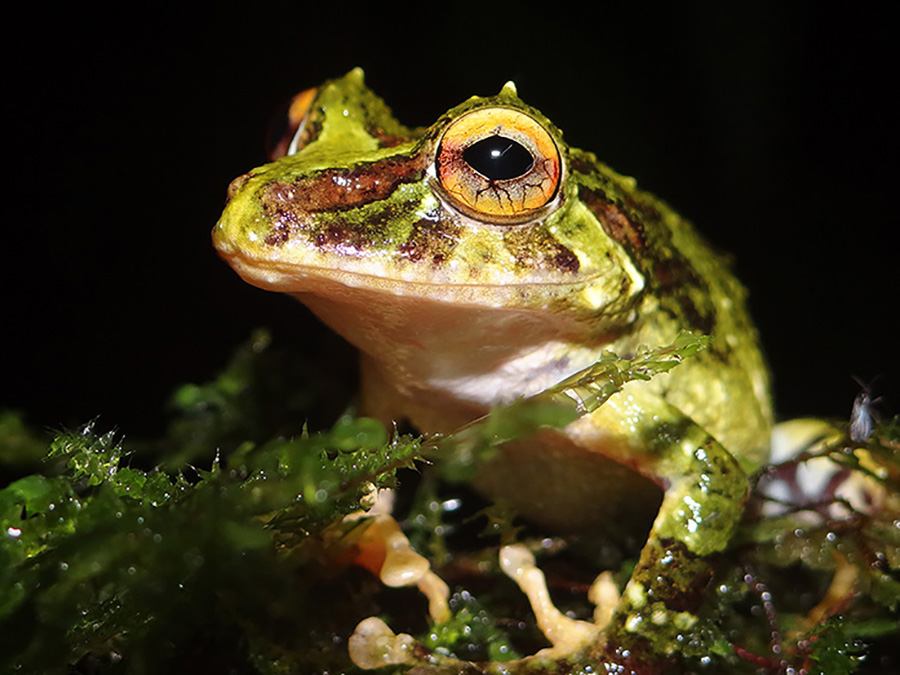Can frogs' ability to survive certain infections help enhance understanding of how to help humans do the same? A new research partnership funded by the National Science Foundation will examine resilience demonstrated by amphibians and other groups of species to emergence and spread of new infectious diseases, along with other human-caused changes to the global ecosystem.
The team from 10 universities around the nation will investigate what has allowed amphibians to bounce back after disease outbreaks, using this group of species as a model for understanding how resilience comes about in other living systems.
"We are, unfortunately, saturated with bad news about the state of the natural world," Jamie Voyles, Co-Director of the institute, field lead for research in Panama and a biologist at the University of Nevada, Reno said." And, to be clear, there’s no question that we are currently facing incredible challenges concerning threats to plants, wildlife and even entire ecosystems. At the same time, we know that some systems are resilient despite the many diverse and lethal threats."
The Resilience Institute Bridging Biological Training and Research, a new center based at the University of Pittsburgh, including collaborator's study sites around the world, is funded by a five-year, $12.5 million grant from the National Science Foundation to consolidate research from a number of institutions.
"Establishing this Institute is so important because we really need to understand ecological resilience – how it works, when it occurs, why some systems are resilient while others are not – as an emergent property of living systems in today’s changing world," Voyles, said.
The scientists have been conducting a range of research and publishing papers for years, most recently one was published in a Royal Society journal in June titled “Divergent regional evolutionary histories of a devastating global amphibian pathogen.”
Working together for 10 years
"We’ve been conducting collaborative research for 10 years, but this is our first opportunity to bring together such a power house of researchers under the umbrella of an institute," Voyles, an associate professor in the College of Science's Department of Biology at the University of Nevada, Reno, said.
A recent scientific paper, on which she is a co-author, detailed how amphibians are being devastated to extinction around the world, with as many as 90 species now extinct and 500 species experiencing dramatic population declines.
"While disease is driving amphibian species to decline, we have also found that some species are hanging on, and we are studying why that may have occurred," Voyles said.
The institute is part of the NSF’s strategy to create large research teams across disciplines and regions to investigate “rules of life” principles – fundamental life processes ranging from biomes to the Earth. This initiative aims to focus on resilience as one such “rule,” applying what they learn about the amphibians’ recovery from a newly emerged fungal to understand how other living systems can bounce back from global change stressors. The study subjects will be amphibians from sites in Brazil, Panama, the Sierra Nevada of California and the Pymatuning Lab of Ecology in northwest Pennsylvania.
“Because we have lots of data over time from around the world on amphibians who are doing better now than they were after the initial disease outbreaks, they are perfect for studying resilience,” Corinne Richards-Zawacki, professor in ecology and evolutionary biology from the University of Pittsburg and principal investigator of the project, said. “We can ask many questions: What mechanisms make them able to live with their pathogens? Are the pathogens changing? What is the impact of different environments? If we understand how the relationship has changed between the species and the threat, we can consider how resilience can be applied to other biological systems.”
Outreach Activites
Outreach activities for the Institute will reach students, teachers, members of the public and wildlife managers with messages about biodiversity, resilience and global change. Together, the Institute’s activities will showcase the power of an integrative, team science approach for addressing some of the biggest and most challenging questions in biology.
In addition to research that spans many disciplines in biology, the team is charged with developing curriculum and programs that will train the next generation of biologists to be ‘integrative’ in their approach to their science as well. As a member of the Executive Committee Voyles will administer and conduct all research and training activities. She is also the field lead for Panama, which is one of her long-term study areas.
The other lead investigators participating in the Resilience Institute include: Gui Becker, University of Alabama; Erica Bree Rosenblum, University of California, Berkeley; Cherie Briggs, Roland Knapp and Thomas Smith, University of California, Santa Barbara; Doug Woodhams, University of Massachusetts, Boston; Michel Ohmer, University of Mississippi; Jamie Voyles, University of Nevada, Reno; Emily Le Sage, Temple University (and until recently Vanderbilt); Mark Wilber, University of Tennessee; Lisa Limeri, Texas Tech University; and Louise Rollins-Smith, Vanderbilt University Medical Center.












